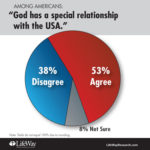WASHINGTON (RNS)—Nearly three-fourths of American adults—including a significant number who claim no religion—believe Jesus was born of a virgin.
A survey from the Pew Research Center reveals 73 percent of American adults believe the Christ child was born to the Virgin Mary as an act of God.
 Madonna With Child by Botticelli.That belief is held overwhelmingly by Christians of all stripes and even by some people with no formal religion. Almost one-third—32 percent—of “nones” say they, too, believe in the Virgin Birth of Jesus.
Madonna With Child by Botticelli.That belief is held overwhelmingly by Christians of all stripes and even by some people with no formal religion. Almost one-third—32 percent—of “nones” say they, too, believe in the Virgin Birth of Jesus.
Women are more certain of this than men, with 78 percent of women and 69 percent of men saying they believe it.
“Women tend to be more religious by most measures such as church attendance and the importance of religion in their lives. This carries over into Christmas,” said Greg Smith, director of U.S. religion surveys for the Pew Research Center.
The survey also showed nearly one in three Americans, including many with no little children at home and those with no religious identity, say they pretend Santa will visit their house on Christmas Eve. Overall, 31 percent of American adults play up the Santa role in their holiday season.
Pew asked 2,001 people about how they celebrate the Christmas season, their memories of childhood Christmas, and what they like or dislike most about the season.
Gathering with friends and family tops the list of activities, at 86 percent. For 69 percent, this socializing is their favorite part of the holidays.
 Overall, 31 percent of American adults play up the Santa role in their holiday season. (RNS Photo courtesy Shutterstock)But the other most frequent activity—buying gifts—led to some surprising findings, said Besheer Mohamed, a Pew Research associate.
Overall, 31 percent of American adults play up the Santa role in their holiday season. (RNS Photo courtesy Shutterstock)But the other most frequent activity—buying gifts—led to some surprising findings, said Besheer Mohamed, a Pew Research associate.
Sign up for our weekly edition and get all our headlines in your inbox on Thursdays
While 86 percent say they expect to buy gifts for friends or family this year, “only about 4 percent say what they look forward to most is buying gifts. It’s not even in the top five favorite things to do.”
However, the top three items on the list of things people dislike about the holidays all relate to gift buying, Mohamed said.
• 33 percent dislike the commercialism or materialism of the holidays.
• 22 percent complained the holidays are “too expensive.”
• 10 percent dislike shopping and crowds.
This doesn’t mean they’re switching to homemade gifts such as baked goods or crafts. Only 58 percent say making gifts will be among their activities this season, compared with 66 percent who say they “typically” did so when they were children.
Other notable shifts from the past include:
• 79 percent say they’ll put up a tree, compared with 92 percent who recall doing so in their childhood.
• 65 percent expect to send Christmas or holiday cards, down from 81 percent who report it typically was done in their childhood.
• 54 percent will attend religious services, a shift from 69 percent when they were young.
The survey was conducted Dec. 3-8 and has a margin of error of plus or minus 2.6 percentage points.














We seek to connect God’s story and God’s people around the world. To learn more about God’s story, click here.
Send comments and feedback to Eric Black, our editor. For comments to be published, please specify “letter to the editor.” Maximum length for publication is 300 words.